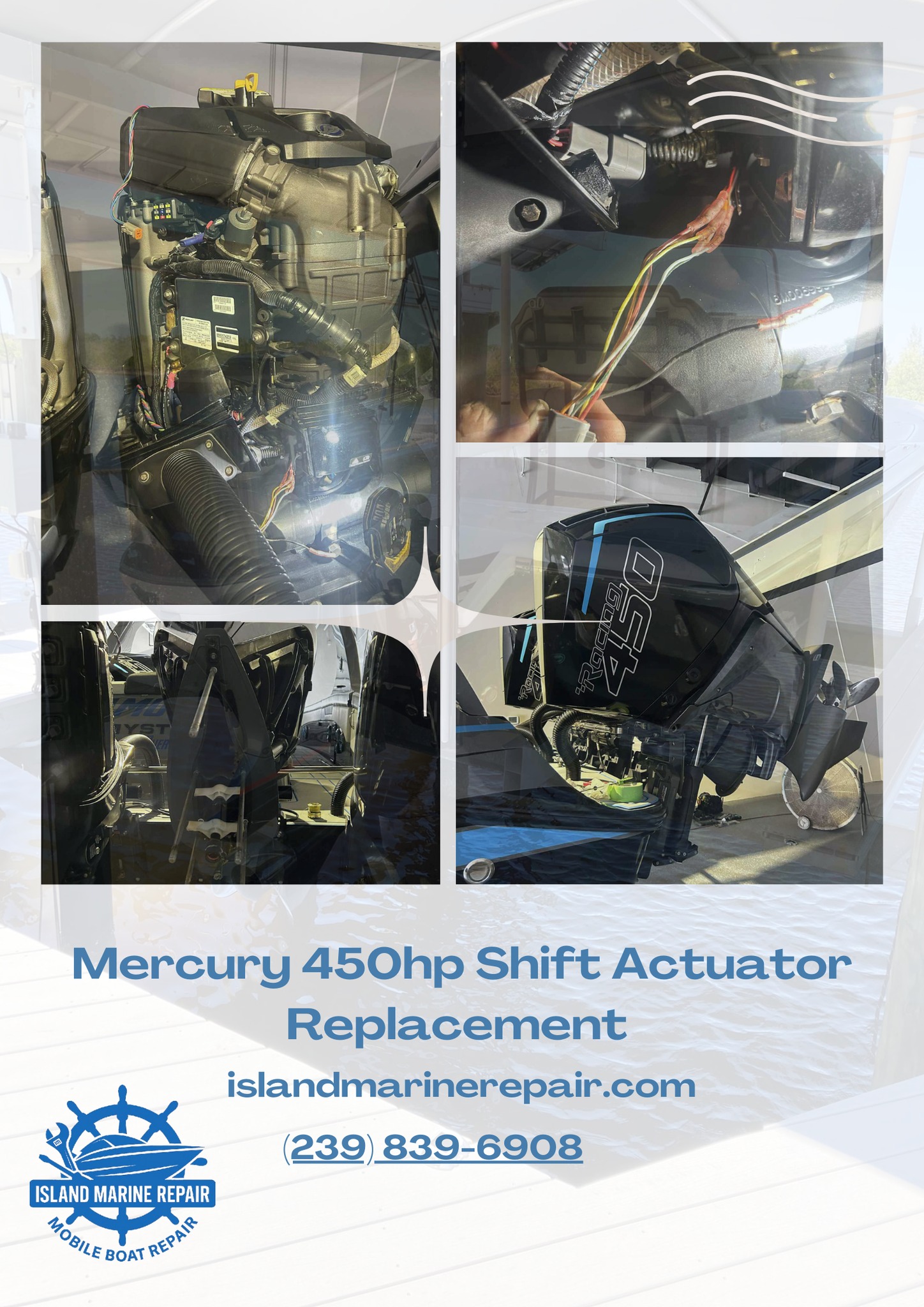Why Fort Myers Anglers Need Routine Outboard Engine Checks
Why Every Fort Myers Angler Should Care About Engine Health
For Fort Myers anglers, time on the water isn’t just recreation — it’s a way of life. From early-morning tarpon runs to weekend redfish trips around Pine Island Sound, reliability matters. But while most boaters think about fuel, tackle, and weather, engine health often gets overlooked until something goes wrong.
That’s where outboard engine diagnostics Fort Myers FL make a difference. More than a maintenance task, diagnostics are a window into how your engine is performing, aging, and adapting to the harsh saltwater environment.
Routine checks reveal hidden insights that protect your investment, improve safety, and even help you fish more efficiently.
What Exactly Are Outboard Engine Diagnostics?
In simple terms, engine diagnostics are digital health scans for your outboard. A mechanic connects your motor’s Electronic Control Module (ECM) to brand-specific software that reads data, error codes, and real-time performance information.
It’s like hooking up your engine to a doctor’s monitor. Within minutes, the technician can see:
-
Sensor readings for temperature, fuel flow, and ignition.
-
Fault codes — both active and historical.
-
Battery voltage trends and alternator health.
-
Run-time hours broken down by RPM range.
-
Peak temperature and load history.
For engines specialized in the service of Mercury and Yamaha engines, diagnostic tools like Mercury SmartCraft or Yamaha YDIS software provide unmatched precision and detail — data you can’t get from generic scanners.
The Hidden Value Behind Routine Engine Checks
While the main goal of diagnostics is preventing breakdowns, the real value lies in what these routine checks reveal about long-term engine behavior and owner habits.
1. Early Detection of Invisible Problems
Engines rarely fail without warning — they just whisper before they scream. Diagnostics interpret those whispers: voltage drops, injector delays, or slight overheating trends. Catching those early saves you thousands and ensures your boat starts every time you turn the key.
For example, an outboard might run fine while fishing one weekend, yet diagnostics could show a failing temperature sensor slowly drifting out of spec. Fixing it early prevents overheating or limp-mode shutdowns later.
2. Improved Fuel Efficiency
Small performance losses — like fouled injectors or misfiring spark plugs — often go unnoticed. But they quietly increase fuel burn. Diagnostic tools reveal imbalanced cylinders or air/fuel ratio inconsistencies that waste gas on every trip.
Tuning these systems properly means fewer refueling stops and lower costs per hour — a benefit serious anglers feel immediately during long Gulf runs.
3. Extended Engine Life
Each diagnostic record tells a story: how often you idle, run at wide-open throttle, or overheat slightly. Mechanics use that data to tailor maintenance schedules to your actual use — not generic intervals.
That customization prevents over-servicing while ensuring critical parts (like impellers or fuel filters) are replaced before they cause damage. The result? Outboards that routinely exceed their expected service life.
4. Better Resale and Trade-In Value
A clean diagnostic report acts like a boat’s medical record — proof of consistent care. Buyers (and dealers) love documentation showing regular scans, error-free operation, and maintenance based on real data.
In Fort Myers’ competitive boating market, that transparency can add real value when selling or upgrading.
5. Increased Safety on the Water
Few things ruin a fishing day faster than losing power miles offshore. Diagnostics reduce that risk dramatically.
By confirming that ignition, fuel, and cooling systems operate within safe limits, they eliminate the element of surprise.
It’s not just about convenience — it’s about ensuring you and your passengers make it back safely when weather or tides turn.
What a Typical Diagnostic Session Looks Like
When you schedule an engine check, here’s what happens behind the scenes:
-
Visual Inspection: Technicians inspect wires, hoses, and electrical connectors for corrosion or wear.
-
Software Connection: They link diagnostic computers to the ECM via manufacturer-specific tools.
-
Data Retrieval: Stored fault codes and performance logs are downloaded.
-
Live Run Testing: The engine runs at idle and under light load to observe real-time data.
-
Interpretation & Reporting: Findings are reviewed, with recommendations for repairs or fine-tuning.
The process usually takes under an hour and costs less than a tank of fuel — a small price for the insight gained.
Why It’s Especially Important in Fort Myers
Florida’s environment tests engines like few places on earth.
Saltwater Exposure
Even with careful rinsing, salt lingers in connectors, thermostats, and cooling passages. Over time, it corrodes sensors and reduces accuracy — problems only diagnostics can catch before failure.
High Heat and UV
Summer heat pushes outboards to their thermal limits. When cooling systems struggle, the ECM logs those events. Regular diagnostics track trends in temperature behavior long before parts fail.
Heavy Usage
Fort Myers anglers often run their boats weekly — sometimes daily during season. That level of use accelerates wear. Routine checks match your engine’s workload with proactive service planning.
Brand-Specific Insights: Mercury & Yamaha Outboards
Diagnostics differ by manufacturer, which is why expertise matters.
-
Mercury Engines: Their SmartCraft systems monitor dozens of parameters. Diagnostics can reveal details like throttle synchronization, gearcase pressure, and water pump efficiency.
-
Yamaha Engines: Yamaha’s Command Link and Helm Master integration generate precise RPM and trim data, helping mechanics optimize engine timing and fuel mapping.
Working with technicians specialized in the service of Mercury and Yamaha engines ensures these complex systems are analyzed correctly. Misinterpreting a code could lead to unnecessary parts replacement — or worse, missed warning signs.
When to Schedule Routine Checks
Most experts recommend diagnostics:
-
Annually — even if your engine seems fine.
-
Before each fishing season — to verify readiness.
-
After storage — to catch fuel or battery issues.
-
Before selling — as proof of maintenance history.
-
After strange performance behavior — hesitation, smoke, or alarm lights.
The best time is before problems appear, not after they cost you a trip or tow.
Understanding Diagnostic Reports
A typical report includes:
| Category | What It Tells You | Why It Matters |
|---|---|---|
| Engine Hours by RPM Range | How hard the engine works | Helps plan maintenance intervals |
| Fault Code Log | Active or past problems | Indicates emerging issues |
| Battery & Voltage Data | Charging system performance | Prevents electrical failure |
| Temperature & Sensor History | Cooling efficiency | Detects heat-related stress |
| Fuel Injection Data | Cylinder balance | Ensures optimal economy |
Reviewing these results annually gives a clear picture of your boat’s mechanical health.
How Diagnostics Support Smarter Fishing
When your outboard runs cleaner and smoother, every aspect of your fishing improves:
-
Faster starts mean getting to favorite spots earlier.
-
Efficient fuel use extends your range.
-
Stable idle and quiet operation help when creeping up on snook or tarpon.
For competitive or charter anglers, that reliability can even mean the difference between landing clients or losing business.
Myths About Diagnostics
“I’ll Know Something’s Wrong Without It.”
Many issues don’t cause immediate symptoms. By the time they do, damage has already begun.
“Diagnostics Are Just for Newer Engines.”
Even 10–15-year-old outboards have ECMs that record data. Scanning them is equally valuable.
“It’s Too Expensive.”
Most diagnostic checks cost less than $200 — far cheaper than replacing a blown injector or ECU.
Routine diagnostics are less about technology costs and more about protecting time and investment.
Integrating Diagnostics With Routine Maintenance
Combining diagnostics with regular service creates a powerful preventive cycle:
-
Oil and Filter Changes: Keep internal lubrication optimal.
-
Diagnostics: Verify engine efficiency and detect electronic faults.
-
Fuel System Checks: Clean injectors and replace filters as needed.
-
Cooling System Maintenance: Inspect impeller and thermostats.
Together, these steps form the foundation of reliable, long-term engine health.
The Real Payoff: Confidence and Consistency
The Gulf doesn’t forgive mechanical neglect. But with consistent maintenance — backed by diagnostics — you can enjoy worry-free days on the water.
When you launch knowing your outboard has been inspected, scanned, and cleared, you gain confidence not just in your engine, but in every trip that follows.
A Real-World Example
A Fort Myers fishing guide noticed one of his twin Yamaha 300s idling slightly rough but producing no alarms. Diagnostics revealed one injector pulsing slower than the rest — a $100 fix caught before it escalated into cylinder scoring.
Without that scan, he might have faced downtime during peak charter season — or worse, a multi-thousand-dollar rebuild.
Environmental Advantages of Routine Checks
A well-tuned outboard burns cleaner and uses less fuel, reducing pollutants that affect Fort Myers’ delicate estuaries. Small efficiency gains across thousands of local boats collectively protect the coastal ecosystem that anglers rely on.
Diagnostics contribute to sustainability — one boat, one trip at a time.
The Bottom Line for Fort Myers Anglers
You wouldn’t head offshore without checking weather, gear, or fuel — your engine deserves the same attention.
Routine outboard engine diagnostics Fort Myers FL checks turn maintenance into foresight, ensuring you spend more time fishing and less time troubleshooting.
Whether you run a Mercury or Yamaha, partnering with professionals specialized in the service of Mercury and Yamaha engines transforms engine care from a guessing game into precision performance management.












